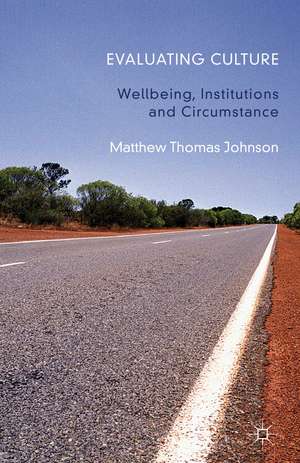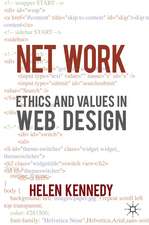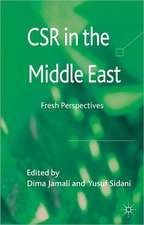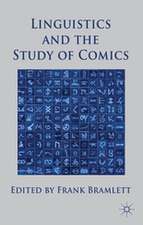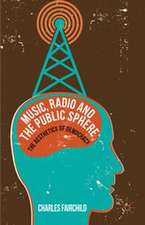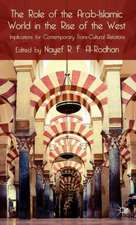Evaluating Culture: Well-Being, Institutions and Circumstance
Autor M. Johnsonen Limba Engleză Hardback – 27 iun 2013
| Toate formatele și edițiile | Preț | Express |
|---|---|---|
| Paperback (1) | 381.43 lei 6-8 săpt. | |
| Palgrave Macmillan UK – 2013 | 381.43 lei 6-8 săpt. | |
| Hardback (1) | 389.11 lei 6-8 săpt. | |
| Palgrave Macmillan UK – 27 iun 2013 | 389.11 lei 6-8 săpt. |
Preț: 389.11 lei
Nou
Puncte Express: 584
Preț estimativ în valută:
74.46€ • 76.93$ • 61.94£
74.46€ • 76.93$ • 61.94£
Carte tipărită la comandă
Livrare economică 19 martie-02 aprilie
Preluare comenzi: 021 569.72.76
Specificații
ISBN-13: 9780230296565
ISBN-10: 0230296564
Pagini: 204
Ilustrații: XI, 204 p.
Dimensiuni: 140 x 216 x 20 mm
Greutate: 0.44 kg
Ediția:2013
Editura: Palgrave Macmillan UK
Colecția Palgrave Macmillan
Locul publicării:London, United Kingdom
ISBN-10: 0230296564
Pagini: 204
Ilustrații: XI, 204 p.
Dimensiuni: 140 x 216 x 20 mm
Greutate: 0.44 kg
Ediția:2013
Editura: Palgrave Macmillan UK
Colecția Palgrave Macmillan
Locul publicării:London, United Kingdom
Cuprins
List of Illustrations Note on the Author Acknowledgements Introduction 1. The Case Against Cultural Evaluation: Relativism, Culturalism and Romanticism 2. Needs, Goods and Self-actualization 3. Capabilities, Zero-sum Choices and Equality 4. What is Culture? What does it do? What should it do? 5. Circumstance, Materialism and Possibilism 6. Applying the Theory: Sources of Harm in Aboriginal Australian Communities Conclusion Endnotes Bibliography Index
Recenzii
Johnson's book is a challenging and highly controversial defence of cultural evaluation. Its philosophical range is exceptionally wide, while its political engagement is informed and sophisticated. Focusing on the case of Aboriginal Australians, Johnson shows both the need for cultural evaluation and the dangers of intervention. This is a book which will be read with profit by anyone working on the politics of cultural diversity.
Sue Mendus, Department of Politics, University of York, UK
This book is remarkable in its ambition. By suggesting an objective basis on which cultures might be evaluated, it seeks to advocate interventions that prevent serious damage to human well-being. This provocative and insightful argument will stimulate significant debate as we grapple with a rapidly globalising world in which different cultures become increasingly intertwined.
Shane O'Neill, School of Politics, International Studies and Philosophy, Queen's University Belfast, UK
Evaluating cultures is one of the most complex and controversial tasks of our age. In examining how we should tackle it, Matthew Johnson's ambitious and carefully crafted study provides answers that are unusually bold in content and wide-ranging in scope. His book is essential reading for all who have to grapple with the phenomenon of culture and its significance for human wellbeing.
Peter Jones, School of Geography, Politics and Sociology, University of Newcastle, UK.
Sue Mendus, Department of Politics, University of York, UK
This book is remarkable in its ambition. By suggesting an objective basis on which cultures might be evaluated, it seeks to advocate interventions that prevent serious damage to human well-being. This provocative and insightful argument will stimulate significant debate as we grapple with a rapidly globalising world in which different cultures become increasingly intertwined.
Shane O'Neill, School of Politics, International Studies and Philosophy, Queen's University Belfast, UK
Evaluating cultures is one of the most complex and controversial tasks of our age. In examining how we should tackle it, Matthew Johnson's ambitious and carefully crafted study provides answers that are unusually bold in content and wide-ranging in scope. His book is essential reading for all who have to grapple with the phenomenon of culture and its significance for human wellbeing.
Peter Jones, School of Geography, Politics and Sociology, University of Newcastle, UK.
Notă biografică
Matthew Johnson is a British Academy Postdoctoral Fellow at the University of York, UK working in political philosophy on issues of cultural diversity and human wellbeing, specifically with regard to physically invasive practices. He has written on such topics as contemporary Marxism, circumcision, and the thought of John Gray, and has previously taught at Newcastle University, the University of Queensland and the University of Iceland.
